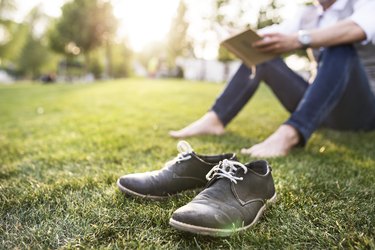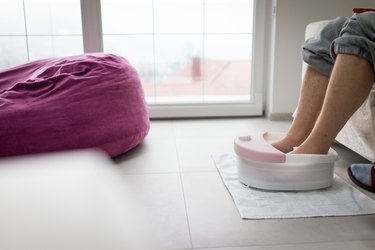
Summertime means sweaty foot time. It's just one of those things that comes with the season. But if you notice your feet are sweating a whole lot regardless of the weather, something else might be going on.
The good news is, there are steps (ha!) you can take to get it under control. Here's what might be causing that extra moisture and what you can do to stop it.
Video of the Day
Video of the Day
1. You’re Wearing Stuffy Shoes
Are your feet breathing?
"Feet, like hands, tend to get sweaty in the summer heat, especially if you're wearing shoes or sandals with non-breathable materials, such as leather," Nelya Lobkova, DPM, a podiatrist at Step Up Footcare in New York, tells LIVESTRONG.com.
When choosing shoes, she recommends buying those with a breathable air mesh upper or breathable rubber soles. Often, athletic shoes are a good option because they're designed to promote airflow. Some, like Allbirds, are even washable in the washing machine.
2. You’re Wearing Soaked Socks (or No Socks at All)
If your feet are especially sweaty, you'll want to focus on wearing socks made of moisture-wicking material. Good options include merino wool (some brands Dr. Lobkova recommends include SmartWool or Darn Tough) and microfiber.
Avoid going barefoot in shoes made of heat-trapping material (like leather), as you'll just sweat more, she says.
3. You’re Not Drinking Enough Water
Proper hydration helps your body stay cool. If you're not drinking enough water, your body will struggle to regulate its temperature, resulting in more sweating, Dr. Lobkova says.
To make sure you're getting enough, she recommends using a 64-ounce stainless steel container (like this one from Hydro Flask), which will keep your water cool all day. You'll only need to refill it once, making it an effortless way to track your intake.
4. You Might Have Hyperhidrosis
Let's say your feet sweat a lot, and it seems like way more than the average person. We're talking "wet footprints on the floor" type of sweating.
"It's common to have sweaty feet, however it's relatively rare to have excessive sweating known as hyperhidrosis," Dr. Lobkova says.
You might be among the 5 percent of the population who has hyperhidrosis if you notice your feet sweat excessively almost all the time rather than under specific circumstances like in hot weather or while exercising, she says.
According to the International Hyperhidrosis Society, treatments that effectively control foot sweat include antiperspirants, Botox injections and a painless, mild electrical current treatment called iontophoresis, available as an at-home device called Dermadry.
Consequences of Sweaty Feet
Trapping sweaty feet into socks or shoes that hold moisture provides the perfect environment for growth of nasties that can cause plantar warts and fungal and bacterial infections, Dr. Lobkova says. Common signs that something’s off? New red spots, scaling or itching, she says. See a doctor or podiatrist for treatment.
How to Stop Feet From Sweating

In addition to following the advice above, if you find that your feet and shoes are especially sweaty (and smelly), here are steps you can take:
1. Powder Your Feet
Sprinkle talc-free foot powder onto feet before putting on socks, Dr. Lobkova recommends. She likes Arm & Hammer Food Odor Control Powder, which contains corn starch and baking soda to sop up sweat.
2. Air Them Out
If your insoles are removable, take them out to dry, Dr. Lobkova says.
3. Sterilize Your Shoes
"A UV-light shoe sterilizer dries out the inside of the shoe, which can harbor unpleasant bacteria, viruses and fungi," Dr. Lobkova says.
One well-rated and well-priced option on Amazon is the Kooder Boot and Shoe Dryer.
4. Soak Your Feet in Tea (Yes, Tea)
After a particularly sweaty day, brew up a foot bath. (Make a cup of strong black tea, and then pour the brew into a basin of cool water big enough for your feet. Make sure the water is an appropriate temperature before slipping in your feet.)
"Black tea contains tannins, which have astringent properties that constrict sweat glands and reduce sweating," Dr. Lobkova says.
Related Reading
Is this an emergency? If you are experiencing serious medical symptoms, please see the National Library of Medicine’s list of signs you need emergency medical attention or call 911.